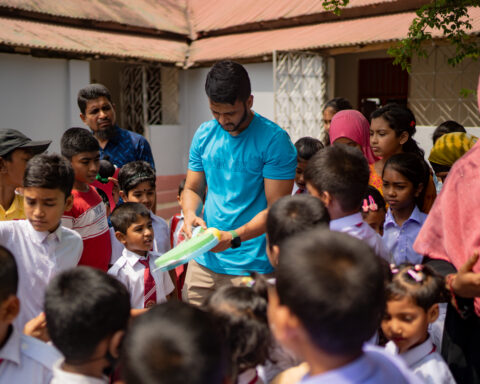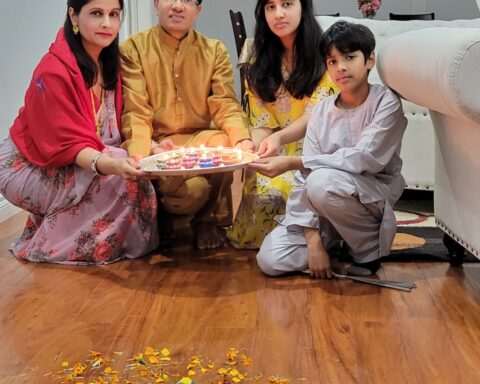Five days after the bodies of Golam Rabbi, 59, and Shamima Rabbi, 57, were discovered at their home in San Jose, California, about three hundred friends and relatives gathered at the Five Pillars cemetery in Livermore on a Friday to bury the couple. With the sun on our back and a brisk breeze blowing, we prayed for their forgiveness and salvation as the bodies were lowered into the grave next to one another while the Imam recited verses from the Quran.
Police have charged the couple’s two sons, Hasib Golamrabbi, 22, and Omar Golamrabbi, 17, with homicide. Both pleaded not guilty to the April 23 murders at their arraignment.
I knew the Rabbis for over two decades as Bangladeshi immigrants who worshiped at the same mosques. We were members of the Evergreen Islamic Center, where Golam, an engineer, and Shamima, an accountant, volunteered their services. Soft-spoken, humble and generous, they radiated peace. Friends sought Golam’s advice on how to grow the perfect apple or peach, drawing on his extensive knowledge of gardening. He often brought his two sons to the mosque to pray next to him. Although I found them rather reserved, nothing seemed amiss or foreboding.
Ever since 9/11, Muslim-Americans have been stereotyped as jihadists and extremists, and found themselves in the cross-hairs of politicians and presidential candidates like Donald Trump, who would stand to gain from such labeling. We have been under siege for home-grown terrorists like those responsible for the 2009 Fort Hood shooting, the 2013 Boston Marathon Bombings and the San Bernardino attacks in 2015.
But this macabre murder is a darker development in which young people have allegedly turned on their own family. Every parent’s nightmare is that their children will kill themselves due to depression, anxiety, stress, or emotional rage, or get killed in gang fights, or wind up in jail, or most frighteningly, run away to join ISIS, as did a teenager from Virginia last year.
Added to these fears now is the fear of violence being turned on the family itself, causing a despair bordering on fatalism.
A week after the killings, a few Bangladeshi-American families in the Evergreen area met to try to make sense of what had happened. After a lot of anguished back and forth, we concluded that we only had a superficial relationship with our children, other than constantly worrying about them. We led our lives and they led theirs, with the occasional intersection that didn’t mean much. We didn’t know what animated them, whether they felt alienated from us, or what they wanted to do with their lives.
[W]e concluded that we only had a superficial relationship with our children.
In the end, we resolved to be more involved in the lives of our children, not as parents but as friends. And not just with our kids, but with the kids of our community.
It is impossible to fathom what Hasib and Omar had been thinking prior to their alleged roles in the killings. A recent Instagram posting by Omar offers a clue: “I always hated myself. Not sure what I am doing here.”
Another clue scrawled on the wall and the floor of the Rabbi home (police have matched the writings to the brothers) is yet more chilling: “Sorry my first kill was clumsy,” and, “I can’t be like you telling a lie … I can’t love someone without telling them.”
While the Quran does not directly address the issue of patricide and matricide, it talks extensively about mercy and forgiveness. “My mercy encompasses all,” says a verse, complemented by a saying of the Prophet Muhammad: “My (that is, God’s) mercy takes precedence over My anger.” Another verse states: “If one is patient in adversity and forgives, this indeed is something to set one’s heart on.”
In the end, we resolved to be more involved in the lives of our children, not as parents but as friends.
But while mercy and forgiveness are pertinent for the wider public, it should be remorse and repentance for the alleged perpetrators. The Quran says: “Those who committed evil deeds and then repented afterwards, surely your Lord is forgiving and merciful.”
Are the sons feeling any remorse? Are they repenting?
We have no way of knowing, unless they themselves disclose what is in their hearts.
No matter how noble the instincts of mercy, forgiveness and repentance may be, however, they will not override the imperatives of justice. San Jose Deputy District Attorney Matt Braker has said, “there are some unanswered questions to this case. Police are working tirelessly to answer those questions and to ensure that both of these victims receive justice.”
So what can we do as we await the trial? Perhaps the answer is contained in one of the verses that the Imam recited after we had buried the Rabbis: “Our Lord! Lay not on us a burden greater than we have strength to bear.”
Hasan ZIlur Rahim is a professor of Mathematics at San Jose City College. He emigrated from Bangladesh to the U.S. four decades ago.
− by arrangement with New America Media




